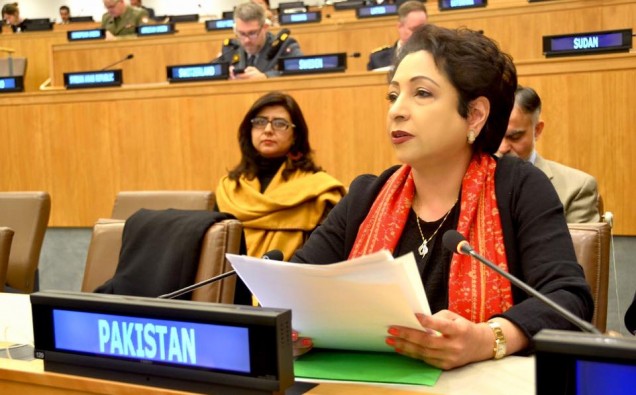
Pakistan on Monday vigorously opposed the addition of new permanent seats to the UN Security Council, with the country’s top diplomat saying that kind of move would only “serve the self-centered interests of a few.”
Permanent Representative Ambassador Maleeha Lodhi’s was referring to a group of a few countries including South Asian rival India that are seeking seats on the influential body, when and if it is expanded from its current 15-member size. Brazil, Germany and Japan are other aspirants for the expanded Council.
“Permanent seats are essentially national seats in perpetuity,” Dr Lodhi said.
“Being the antithesis to the principle of political and democratic representation, every permanent seat added to the Council will foreclose a valuable opportunity for many capable and aspiring States to serve on the Council and also be accountable to their respective regions through periodic elections,” she said.
“There should be no additional permanent seats,” the envoy stated categorically as the Inter-Governmental Negotiations aimed at reforming the Security Council resumed the process on Monday.
Envoys have been negotiating proposals to restructure the Security Council in the General Assembly since February 2009. The reforms pertain to five key areas — the categories of membership, the question of veto, regional representation, size of an enlarged Security Council, and working methods of the council and its relationship with the General Assembly.
However, member states have for years remained divided over the details despite a general agreement on enlarging the Council, as part of the UN reform process.
Currently, the Security Council has five permanent members — Britain, China, France, Russia and the United States, and 10 non-permanent members that are elected in groups of five to two-year terms.
Pakistan, a leader in the Uniting for Consensus (UfC) group, stands for creating a new category of members — not permanent members — with longer duration and a possibility to get re-elected.
In the ongoing efforts to make the Security Council more representative and democratic, Ambassador Lodhi called for ensuring that any expansion would not compromise the Council’s compact nature and efficacy.
“A significant increase would open greater opportunity for wider representation while a smaller increase will guard against making it unwieldy and tend to keep the Council effective,” she said.
In balancing these two considerations, she stressed the need for the justification of every seat added to the Security Council on the grounds of its contribution to its representativeness and effectiveness.
She also underlined the need to enhance regional and equitable representation of Asia-Pacific, Africa, Latin America and Eastern Europe, saying that every added seat should meet and address this need.
“This plainly rules out any possibility of satisfying the national ambitions of a few in a limited expansion of the Council,” she said.
“Simply put, nothing justifies sacrificing the legitimate interest of all UN Member States to serve the self-centered interests of a few. Moreover, this would be a travesty of the principle of the sovereign equality of States.”
Ambassador Lodhi said in most instances a standoff or deadlock between the permanent members prevented the Council from fulfilling its mandate. “How then, can we even consider doubling the number of permanent seats in the Council? Arguments to the contrary defy logic.”
Pakistan, she said, stood for expanding the Security Council by an appropriate number in the mid-twenties so long as the seats added to the Council remain electable on the basis of fixed rotation and periodic elections. “Each additional seat in the Council should be open to all Member States on the principle of equitable geographic representation. There should be no additional permanent seats.”
On working methods of the Council, Ambassador Lodhi said there was a broad consensus on enhancing transparency, inclusive decision-making and accountability of the Council.
“Because the Council considers itself a master of its own procedures, it is important to consider developing a joint mechanism between the Council and the General Assembly on improving its existing working methods. Such a mechanism could open the Council’s Working Group on working methods to the inputs and proposals of all Member States and could help identify common grounds.
Noting that non-permanent members have always been more active in improving the Council’s working methods, the Pakistani envoy said permanent members have tended to be more conservative. “The reasons are apparent. Elected members cannot ignore the importance of openness and transparency because their presence in the Council is temporary. Their efforts to improve working methods strengthen their credentials for future election to the body. This is how a system of fixed rotation and periodic elections is intricately linked to the Council’s working methods.
Terming the argument that more permanent members will enhance the Council’s openness and transparency “disingenuous”, she said such a course will not only decelerate the pace of improvement in the Council’s working methods, and complicate its decision-making.














